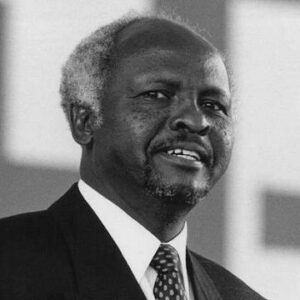Canaan Banana was an influential political leader of Zimbabwe who, after a protracted struggle of independence, became the country’s first black president. As a Methodist pastor and a radical theologian, Banana’s early political career garnered a prestigious reputation. He played a significant part in the global black liberation movement that overthrew the all-white Smith regime and, subsequently, racism in the country. Banana was essential in halting ethnic bloodshed in Matebeleland by merging the ZANU and ZAPU political organizations, albeit holding only a ceremonial role (since the real power rested with Prime Minister Robert Mugabe). When he was convicted of sodomy, however, his once-outstanding reputation as a politician suffered a significant decline. The accusation that Banana sexually harassed his subordinates was a sad end to an illustrious career. The judge was impressed by the evidence against him and sentenced him to ten years in jail for homosexual assault despite his repeated protests. Following the sexual controversy, he lost his clerical position.
Youth and Early Life
Canaan Banana was born in Essexvale, Southern Rhodesia, on March 5, 1936. His father was a Rhodesia-immigrant immigrant (the earlier name of Zimbabwe),.
Banana pursued his desire to become a teacher by enrolling in the Tegwani Training Institute after receiving his early education from missionaries at a local school.
In 1962, he graduated from Epworth Theological College in Salisbury with a degree in theology. He was ordained as a United Methodist minister the same year.
From 1974 to 1975, he attended Wesley Theological Seminary in Washington, D.C. for one year.
Canaan Banana’s Career
Banana accepted teaching jobs at numerous universities, including Epworth Theological College, Kansai Industrial Centre, Wesley Theological Seminary, and the University of South Africa, after receiving his degree.
Soon after beginning his teaching career, he became interested in the country’s political issues. He was the chairman of the Bulawayo Council of Churches from 1969 to 1970. From 1970 to 1973, he served for three years as a member of the Southern Africa Urban Industrial Mission.
In the meantime, he was a founding member and vice president of the African National Council, led by Bishop Abel Muzorewa, from 1972 to 1973. As an ANC member, he represented the group in the United States and the United Nations.
Banana joined ZANU (Zimbabwe African National Union), led by Robert Mugabe, in the latter half of the 1970s, despite holding opposing views to Bishop Abel Muzorewa. ZANU’s primary objective was to depose the administration of Ian Smith. At the time, Ian Smith was the prime minister of Zimbabwe.
Due to his belligerent political conduct, he was apprehended on multiple occasions. Furthermore, his publications containing rebellious thoughts were prohibited. However, he did not abandon his political aspirations.
Banana was chosen as the country’s first president in 1980, after its independence.
His presidency reached its zenith when he played a key role in the unification of Zimbabwe’s two political organizations, ZANU and ZAPU (Zimbabwe African People’s Union). The Unity Accord ended the Matebeland massacre, which resulted in the deaths of over 20,000 residents.
In 1987, he resigned from his position as president after Robert Mugabe, then the country’s prime minister assumed the role of executive president.
After his stint as president, he joined the Organisation of African Unity as a diplomat in an effort to broker peace in Liberia. He even served as the University of Zimbabwe’s religious leader. He was also a member of the panel of distinguished churchmen investigating commerce in South Africa appointed by the United Nations.
In 1989, he led the World Council of Churches members who intended to end apartheid in South Africa.
In 1997, he was jailed on sodomy charges after his former bodyguard made this surprising revelation during a murder trial. During his presidency, it was revealed that Canaan Banana forced several men to accept his sexual advances.
He was condemned to ten years in prison in 1999. He only spent six months in an open prison before going to the United Kingdom, where he was placed under house arrest.
His Notable Works
The banana did justice to his schooling by establishing his mark in liberation theology with his book, “The Gospel According to the Ghetto.” He also created a customized version of the “Lord’s Prayer” that compelled Africans to oppose white power.
As President, he played a vital part in the merger of ZANU and ZAPU, which put an end to the massacre of innocent civilians.
Personal History and Legacy
In 1961, Banana tied the knot with Janet Mbuyazwe. Michael Thabo, Nathan Sipho, Martin Mhambi Salaam, and Nobuhle Beauty are the names of the couple’s four children: sons and daughters.
Banana died of cancer at the Charing Cross Hospital in Hammersmith on November 10, 2003. His body was transported to Zimbabwe for burial. The banana did not receive full state honors despite being a previous head of state due to his soiled reputation.
Estimated Net worth
Canaan is one of the wealthiest and most popular politicians in the world. According to our research, Wikipedia, Forbes, and Business Insider, Canaan Banana has an estimated net worth of $1.5 million.
Trivia
Canaan Banana, after ascending to the presidency, enacted a rule prohibiting residents from making jokes about his name.


